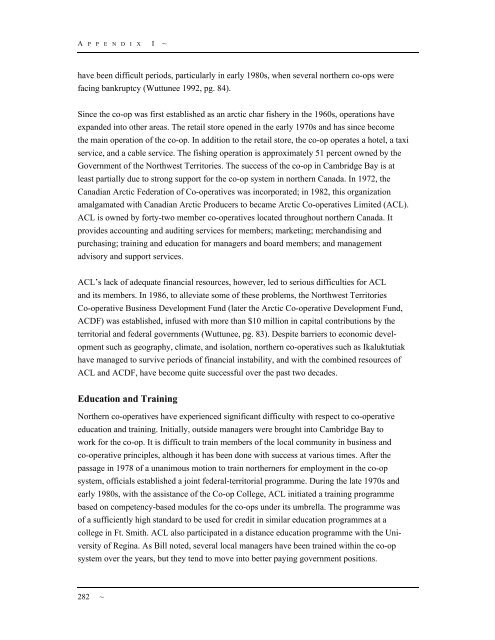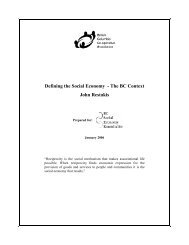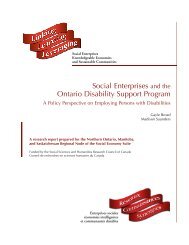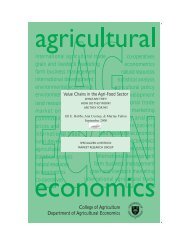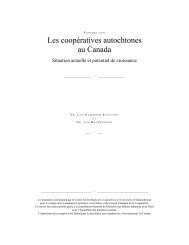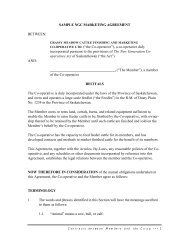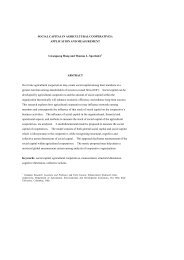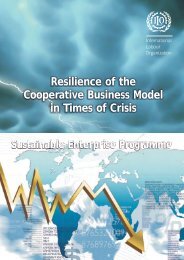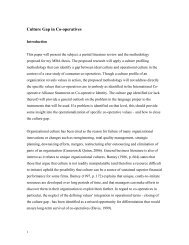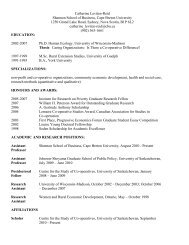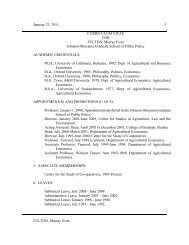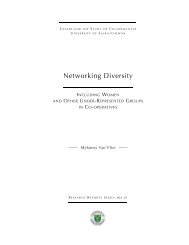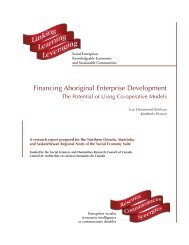Aboriginal Co-operatives in Canada - Centre for the Study of Co ...
Aboriginal Co-operatives in Canada - Centre for the Study of Co ...
Aboriginal Co-operatives in Canada - Centre for the Study of Co ...
Create successful ePaper yourself
Turn your PDF publications into a flip-book with our unique Google optimized e-Paper software.
A P P E N D I X I ~have been difficult periods, particularly <strong>in</strong> early 1980s, when several nor<strong>the</strong>rn co-ops werefac<strong>in</strong>g bankruptcy (Wuttunee 1992, pg. 84).S<strong>in</strong>ce <strong>the</strong> co-op was first established as an arctic char fishery <strong>in</strong> <strong>the</strong> 1960s, operations haveexpanded <strong>in</strong>to o<strong>the</strong>r areas. The retail store opened <strong>in</strong> <strong>the</strong> early 1970s and has s<strong>in</strong>ce become<strong>the</strong> ma<strong>in</strong> operation <strong>of</strong> <strong>the</strong> co-op. In addition to <strong>the</strong> retail store, <strong>the</strong> co-op operates a hotel, a taxiservice, and a cable service. The fish<strong>in</strong>g operation is approximately 51 percent owned by <strong>the</strong>Government <strong>of</strong> <strong>the</strong> Northwest Territories. The success <strong>of</strong> <strong>the</strong> co-op <strong>in</strong> Cambridge Bay is atleast partially due to strong support <strong>for</strong> <strong>the</strong> co-op system <strong>in</strong> nor<strong>the</strong>rn <strong>Canada</strong>. In 1972, <strong>the</strong>Canadian Arctic Federation <strong>of</strong> <strong>Co</strong>-<strong>operatives</strong> was <strong>in</strong>corporated; <strong>in</strong> 1982, this organizationamalgamated with Canadian Arctic Producers to became Arctic <strong>Co</strong>-<strong>operatives</strong> Limited (ACL).ACL is owned by <strong>for</strong>ty-two member co-<strong>operatives</strong> located throughout nor<strong>the</strong>rn <strong>Canada</strong>. Itprovides account<strong>in</strong>g and audit<strong>in</strong>g services <strong>for</strong> members; market<strong>in</strong>g; merchandis<strong>in</strong>g andpurchas<strong>in</strong>g; tra<strong>in</strong><strong>in</strong>g and education <strong>for</strong> managers and board members; and managementadvisory and support services.ACL’s lack <strong>of</strong> adequate f<strong>in</strong>ancial resources, however, led to serious difficulties <strong>for</strong> ACLand its members. In 1986, to alleviate some <strong>of</strong> <strong>the</strong>se problems, <strong>the</strong> Northwest Territories<strong>Co</strong>-operative Bus<strong>in</strong>ess Development Fund (later <strong>the</strong> Arctic <strong>Co</strong>-operative Development Fund,ACDF) was established, <strong>in</strong>fused with more than $10 million <strong>in</strong> capital contributions by <strong>the</strong>territorial and federal governments (Wuttunee, pg. 83). Despite barriers to economic developmentsuch as geography, climate, and isolation, nor<strong>the</strong>rn co-<strong>operatives</strong> such as Ikaluktutiakhave managed to survive periods <strong>of</strong> f<strong>in</strong>ancial <strong>in</strong>stability, and with <strong>the</strong> comb<strong>in</strong>ed resources <strong>of</strong>ACL and ACDF, have become quite successful over <strong>the</strong> past two decades.Education and Tra<strong>in</strong><strong>in</strong>gNor<strong>the</strong>rn co-<strong>operatives</strong> have experienced significant difficulty with respect to co-operativeeducation and tra<strong>in</strong><strong>in</strong>g. Initially, outside managers were brought <strong>in</strong>to Cambridge Bay towork <strong>for</strong> <strong>the</strong> co-op. It is difficult to tra<strong>in</strong> members <strong>of</strong> <strong>the</strong> local community <strong>in</strong> bus<strong>in</strong>ess andco-operative pr<strong>in</strong>ciples, although it has been done with success at various times. After <strong>the</strong>passage <strong>in</strong> 1978 <strong>of</strong> a unanimous motion to tra<strong>in</strong> nor<strong>the</strong>rners <strong>for</strong> employment <strong>in</strong> <strong>the</strong> co-opsystem, <strong>of</strong>ficials established a jo<strong>in</strong>t federal-territorial programme. Dur<strong>in</strong>g <strong>the</strong> late 1970s andearly 1980s, with <strong>the</strong> assistance <strong>of</strong> <strong>the</strong> <strong>Co</strong>-op <strong>Co</strong>llege, ACL <strong>in</strong>itiated a tra<strong>in</strong><strong>in</strong>g programmebased on competency-based modules <strong>for</strong> <strong>the</strong> co-ops under its umbrella. The programme was<strong>of</strong> a sufficiently high standard to be used <strong>for</strong> credit <strong>in</strong> similar education programmes at acollege <strong>in</strong> Ft. Smith. ACL also participated <strong>in</strong> a distance education programme with <strong>the</strong> University<strong>of</strong> Reg<strong>in</strong>a. As Bill noted, several local managers have been tra<strong>in</strong>ed with<strong>in</strong> <strong>the</strong> co-opsystem over <strong>the</strong> years, but <strong>the</strong>y tend to move <strong>in</strong>to better pay<strong>in</strong>g government positions.282 ~


